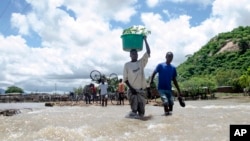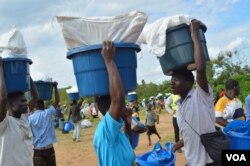Local and international organizations are responding to the Malawi government’s call for relief aid to help hundreds of thousands of people displaced by flooding and facing a growing threat of waterborne diseases.
“I appeal for humanitarian assistance from the international donor community, the relevant United Nations agencies, the non-governmental organizations, the local private sector as well as all fellow citizens of goodwill, so that, together, we can contribute in alleviating suffering on the part of people affected by the floods," President Peter Mutharika said at a news conference in the capital, Lilongwe. Mutharika has declared 15 of the country’s 28 districts disaster areas.
The president's appeal came after the Department of Disaster Management Affairs said it had exhausted all the money reserved for this year’s national disasters.
Government statistics show that more than 170 people have been killed while another 600,000 have been displaced by the floods in the country because of week-long torrential rains.
Most of those displaced have found refuge in primary schools and churches where most of them have been complaining of a lack of food and clean water.
Eighty-seven-year-old Edina Kachala is among hundreds of people camping at Mbona primary school in the southern district of Phalombe.
“The main problem here at the camp is food and we don’t have money to buy soap," Kachala explained. "We only find something to eat after some people here do some peace works somewhere. We are just waiting to see what the government will do for us.”
The World Food Program is among several international organizations delivering maize, beans, oil and super-cereal to displaced people in most hard-hit areas. It says 77 metric tons of biscuits, enough to feed 77,000 people, were airlifted into Malawi from the U.N. Humanitarian Response Depot in Dubai earlier this week.
Local charity organizations have intensified their efforts to provide relief aid.
Aamir Jakhura of Asian Muslims Relief Aid told VOA the charity has mobilized about $750,000 for humanitarian assistance to flood victims in most of the affected areas and that more than 10,000 families have received relief packages.
“The packages include mosquito net, plastic utensils like folks, spoons, cups, basins, buckets, some maize seed for those who have lost their gardens, and a few other items as well," Jakhura said.
Advocacy groups are working to prevent the outbreak of waterborne diseases in the camps, along with wells and boreholes contaminated by the floods.
Kate Harawa, country director for the NGO Water for People in Malawi, tells VOA her organization has budgeted $50,000 to water and sanitation programs for the displaced people.
“What we have found out, especially in Blantyre, is that hygiene was a problem, and water supply was a problem, and most of them were using unsafe water," Harawa said. "So, as a matter of urgency, we make sure that people have HTH, which is the granular form of chlorine that is used to treat water at the household level or at the camp level, and also provide hygiene education to people in the camp.”
Harawa added that her organization will soon start constructing temporary latrines in the camps, provide storage tanks for water and buckets for collecting water.
During a public meeting last week in Blantyre, President Mutharika hailed local and international organizations for what he called a swift response to his appeal for disaster relief aid.
Meanwhile, the government has intensified efforts to relocate people from flood-prone areas to the upland for safety, as torrential rain continues in most parts of the country.







